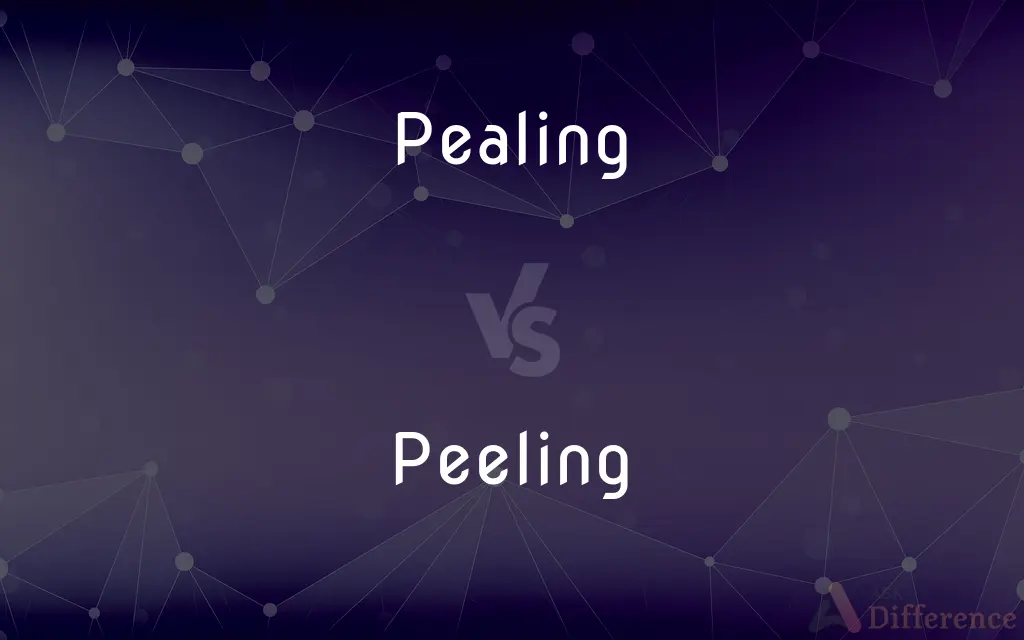Pealing vs. Peeling — What's the Difference?
Edited by Tayyaba Rehman — By Urooj Arif — Updated on April 22, 2024
"Pealing" refers to the sound of bells ringing, often in a sequence, while "peeling" describes removing the outer layer or skin from something, typically food.

Difference Between Pealing and Peeling
Table of Contents
ADVERTISEMENT
Key Differences
Pealing is associated with the sound of bells, especially in a sequence or a repeated ringing pattern, often used for celebrations or church services, whereas peeling involves the removal of an outer layer, such as the skin of fruit or vegetables, or paint from a surface.
The action of pealing is auditory and symbolic, marking events or moments of significance, while peeling is a physical action typically associated with food preparation or maintenance tasks.
Pealing bells can create a rich, resonant sound that carries across distances, contributing to atmospheric or ceremonial settings, on the other hand, peeling can be a routine task requiring manual effort to strip away outer layers.
The term "pealing" is derived from the specific function of bells and their traditional use in communication and celebration, whereas "peeling" comes from the action of removing or stripping away.
While pealing is a collective experience often shared by a community during events, peeling is usually an individual task focused on preparation or cleaning.
ADVERTISEMENT
Comparison Chart
Definition
The act of ringing a set of bells
Removing the outer layer or skin
Associated With
Bells, celebrations
Food, paint, other surfaces
Action Type
Auditory, symbolic
Physical, manual
Purpose
Mark events, create ambiance
Prepare, clean, maintain
Experience
Collective, public
Individual, private
Compare with Definitions
Pealing
To make a loud ringing sound.
The sound of pealing laughter filled the room.
Peeling
Often requires tools or implements.
Using a vegetable peeler, she quickly finished peeling the carrots.
Pealing
The ringing of a set of bells elaborately or as a form of celebration.
The church bells were pealing joyously on Christmas morning.
Peeling
Can refer to the flaking or coming off of layers.
The paint on the old barn was peeling badly.
Pealing
Symbolizes public or community announcements.
The village square echoed with the pealing of bells announcing the festival.
Peeling
To strip away the outer layers from something, especially in cooking.
She was peeling potatoes at the kitchen counter.
Pealing
Often used in reference to bells in a religious or festive context.
The pealing of the cathedral bells could be heard miles away.
Peeling
The process of removing skin or coverings.
He began peeling the old wallpaper off the wall.
Pealing
Can also refer to any loud, ringing sound.
The pealing of thunder warned of the approaching storm.
Peeling
Used in both culinary and non-culinary contexts.
Peeling an orange, he tossed the peels into the compost.
Pealing
A ringing of a set of bells, especially a change or set of changes rung on bells.
Peeling
A piece or strip, as of skin or vegetable rind, that has been peeled off.
Pealing
A set of bells tuned to each other; a chime.
Peeling
The act of removing the outer surface in strips.
Pealing
A loud burst of noise
Peals of laughter.
Peeling
Strips of an outer rind or surface that has been removed.
She flavored the broth with vegetable peelings.
Pealing
To sound in a peal; ring.
Peeling
Present participle of peel
Pealing
To cause to peal.
Peeling
Loss of bits of outer skin by peeling or shedding or coming off in scales
Pealing
Present participle of peal
Peeling
Having the paint loose and peeling away;
A dilapidated house with peeling paint
Peeling row houses
Pealing
The sound made by bells as they peal.
Pealing
A deep prolonged sound (as of thunder or large bells)
Common Curiosities
What is the difference between pealing and ringing?
Pealing specifically refers to the elaborate or prolonged ringing of bells, often in a sequence, while ringing can be more general or singular.
Does pealing have a spiritual significance?
Yes, in many cultures, the pealing of bells is used to signify religious ceremonies, call to worship, or celebrate spiritual milestones.
How do I care for peeling paint on a house?
Addressing peeling paint typically involves scraping off the loose paint, sanding the surface, and applying new paint for protection and aesthetics.
What tools are used for peeling?
Common tools for peeling include knives, vegetable peelers, and, in industrial settings, mechanical peelers.
Can pealing be done with any type of bell?
Yes, pealing can be done with any set of bells, though it often involves larger bells in a belfry or bell tower.
What are the consequences of not peeling some vegetables?
For some vegetables, leaving the peel on can increase nutritional intake, though it may affect texture or digestibility depending on the vegetable.
Why is peeling important in cooking?
Peeling is important for removing inedible or undesirable outer layers from food before consumption or further cooking.
Is there a technique to make peeling easier?
Proper techniques and the right tools can make peeling easier, such as blanching tomatoes to loosen their skins.
What causes fruit peels to be harder to peel in some cases?
Variations in the ripeness and type of fruit can affect the ease of peeling; underripe or certain varieties may have tougher peels.
Can pealing be automated in any way?
While automated bell-ringing systems exist, they do not replace the traditional method of pealing bells by hand for certain ceremonies.
Share Your Discovery

Previous Comparison
Colloquialism vs. Idiom
Next Comparison
Nonpartisan vs. BipartisanAuthor Spotlight
Written by
Urooj ArifUrooj is a skilled content writer at Ask Difference, known for her exceptional ability to simplify complex topics into engaging and informative content. With a passion for research and a flair for clear, concise writing, she consistently delivers articles that resonate with our diverse audience.
Edited by
Tayyaba RehmanTayyaba Rehman is a distinguished writer, currently serving as a primary contributor to askdifference.com. As a researcher in semantics and etymology, Tayyaba's passion for the complexity of languages and their distinctions has found a perfect home on the platform. Tayyaba delves into the intricacies of language, distinguishing between commonly confused words and phrases, thereby providing clarity for readers worldwide.
















































